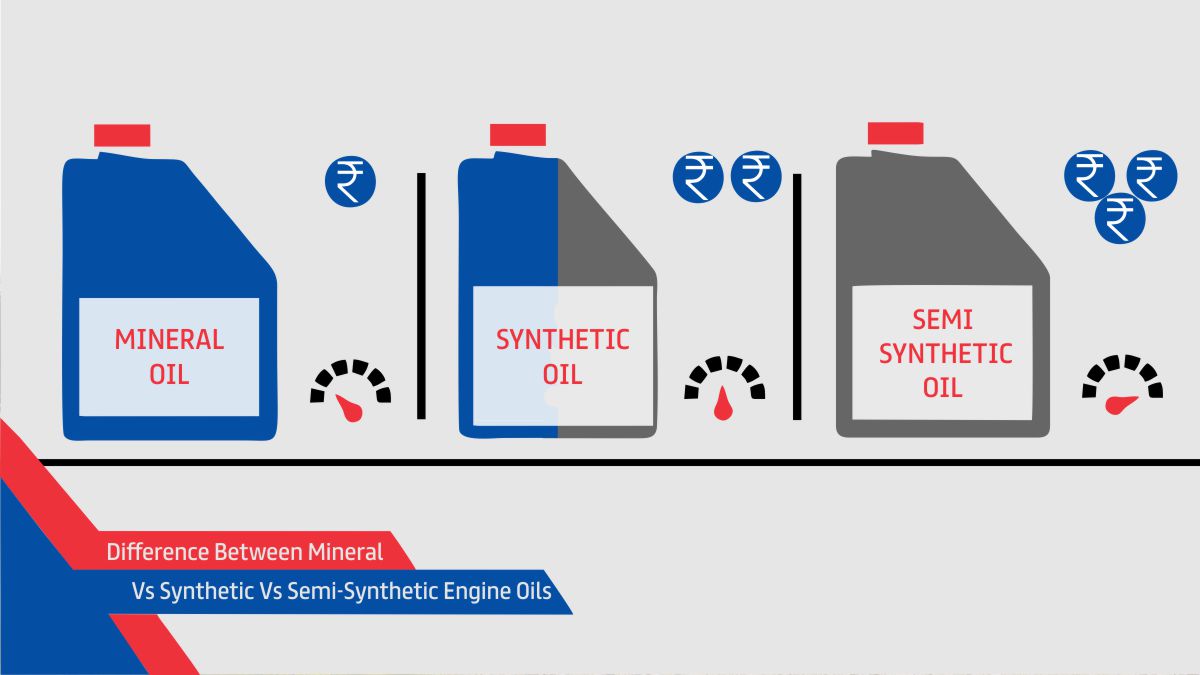While all of us want to feed our beloved two-wheeler engines with the best engine oil, we are often confused about the grades, brands and varieties available. This confusion generally has its roots in our lack of knowledge about viscosity grades, and our lack of understanding of the basic differences between mineral, synthetic and semi-synthetic oils. Here in this article, we will explain to you all the basics of engine oil, equipping you with the required knowledge to make the right decision the next time you choose the lubricant for your two-wheeler
Types of engine oilsEngine oils are classified into three primary categories for two-wheelers based on the way they are manufactured and their qualities – mineral oils, semi-synthetic oils and fully synthetic oils. Here’s what each variety of engine oil encompasses
Conventional / Mineral oilThis is the most basic variety of engine oils and is most commonly used for a large majority of everyday vehicles. Mineral oils are refined petroleum oils which undergo treatment to perform across a wide temperature range and get fortified with other additives to comply with specific requirements of a two-wheeler. Of course, there is a wide range of quality available within mineral oils too, though their price is generally lower than the other two varieties of oils. These engine oils work well for everyday two-wheelers driven in conditions which are not too extreme (hot, cold, dusty, hilly, strenuous etc).
Semi-Synthetic oilSemi-synthetic oil, also known as synthetic blend oil has a small amount of synthetic engine oil (explained in detail in the next section) blended in with mineral oil to boost its properties without escalating the cost by much. The addition of synthetic oil enhances its viscosity and wear resistance at higher temperatures and stress. Synthetic-blend engine oils can also offer better performance at lower temperatures, based on the requirements.
Synthetic oilSynthetic oils are essentially mineral oils only; however, they go through an extensive treatment in the lab to make them significantly superior to their mineral counterparts. As a part of the process, the mineral oil is broken down into its most basic molecules, which helps remove any undesired substances and impurities to a very high degree. The molecules of synthetic oil are also very consistent in their size and shape, offering superior lubrication. The broken down molecules also lend themselves well to being tailored to specific requirements like performance in low or hi temperatures, or under extraordinary stress. This process of breaking down mineral oil into its basic molecules is an expensive and painstaking one, which makes synthetic oils more expensive.
Apart from performing exceptionally well in extreme cold and hot conditions, these engine oils have other superior properties too. These include lesser evaporation, low smudge formation and better detergent properties.
So which type of engine oil should you buy?As a rule of thumb, everyday, average performance motorcycles don’t require you to spend extra for semi-synthetic or synthetic oil. A good quality mineral oil which complies with the grade recommended by the manufacturer should work well enough. You should be careful to replace the engine oil at recommended time intervals, buy a trustworthy brand, and you should be fine.
Motorcycles which are slightly performance oriented, and are ridden enthusiastically, would do well with a synthetic blend oil. Synthetic blend equips these motorcycle with some added protection under extreme stress without taking the cost northwards by much.
If, however, you use a high-performance motorcycle, have an aggressive, extreme riding style, and often participate in motorcycle rallies or travel a long distance, which puts a lot of stress on the engine, your motorcycle would benefit with synthetic engine oil.
In any case, it is important that you choose a reputed brand of oil and ensure that you adhere to the viscosity grades recommended by the two-wheeler manufacturer.
There are a whole bunch of things that could be considered while buying engine oils. We’ll touch upon them in our upcoming articles. In the meantime, we hope this article dedicated to the differences between synthetic and mineral oils was useful to you.




Wants to improve my bike performance and a sound coming from front wiser